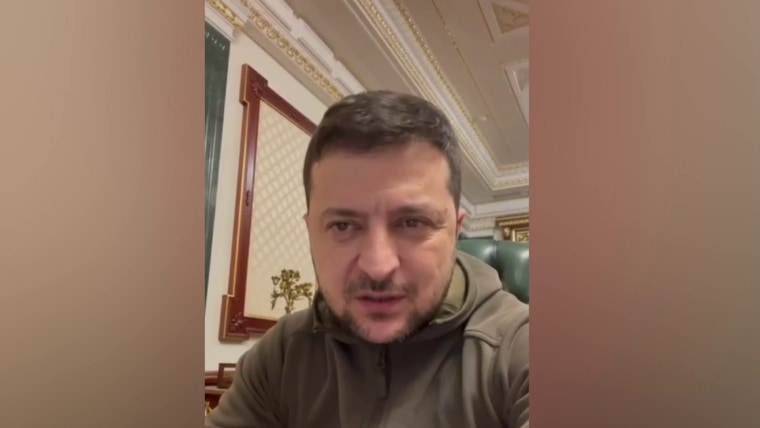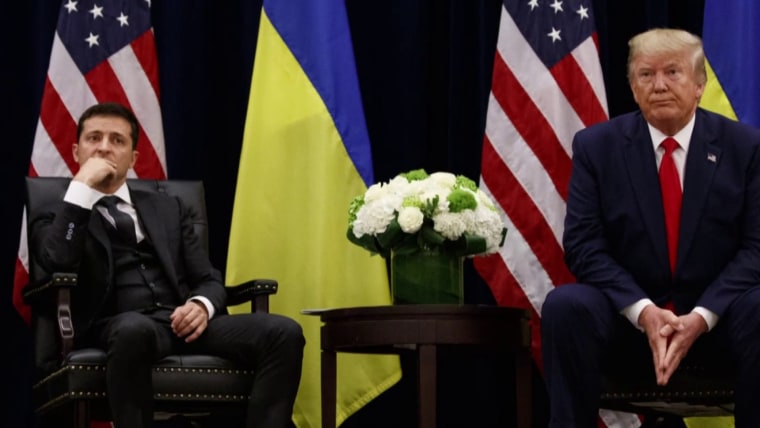On July 25, 2019, President Donald Trump asked Ukrainian President Volodymyr Zelenskyy for a favor.
Zelenskyy had been in office for less than two months. A former comedian, he’d unseated the incumbent with a pledge to root out systemic corruption. His country had already been fighting Russian-backed militias in the east for five years; American aid was crucial to preventing a rebel victory.
Trump was, meanwhile, riding high. He’d just dodged a bullet — again — by successfully spinning then-special counsel Robert Mueller's report into a vindication that there was “no collusion.” Freed from the Russia investigation, he had his sights firmly set on the 2020 election and what Zelenskyy could do to improve his odds.
The similarities between Zelenskyy and Trump now seem much shallower than they did then.
As of Monday, it has been 963 days since that phone call, and the reversal of fortunes between the two men since then cannot be starker. It has been 901 days since the full contents of Trump’s “perfect call” with Zelenskyy were begrudgingly made public. It has been 817 days since the House of Representatives impeached Trump for the scheme underlying his call to Zelenskyy. It has been 18 days since Russia invaded Ukraine, transforming Zelenskyy into an unlikely war hero.
When Zelenskyy was running for office, the possibility of a country electing a man who had played the president on television prompted comparisons to our own decision to place in the White House a man best known for playing a businessman on television. Neither had any background in politics. Both leaned into their innate showmanship while campaigning, lending their respective elections a circus-like feeling at times.
It's to everyone’s benefit that the similarities between Zelenskyy and Trump now seem much shallower than they did then.

Zelenskyy and his advisers knew before he was even sworn in that the American president would be a concern. Trump’s personal lawyer, Rudy Giuliani, had spent the last few months on the hunt for proof that Ukraine, not Russia, had interfered with the 2016 U.S. presidential election. A disgraced Ukrainian former prosecutor with a grudge against former Vice President Joe Biden had also been filling Giuliani’s ear with whispers of potential scandal surrounding Biden’s son Hunter, who was doing business in the country.
Just hours after the call between Trump and Zelenskyy, Ukrainian officials in Washington were hearing rumors that the United States was withholding $391 million in military aid that Congress had approved. The rumors were correct. Back in Ukraine, the ask had already been made: All Zelenskyy had to do was announce that the Bidens were under criminal investigation. The international scandal would sink Biden’s recently launched run for president before it had even begun; Ukraine would get the aid that Trump had ordered held and a long sought-after meeting at the White House.
Zelenskyy has become a meme in the most literal sense.
Three years ago, Zelenskyy was forced into a corner by a supposed friend. With his back to the wall, he capitulated to Trump’s demands. Zelenskyy was scheduled to sit down for an interview with CNN on Sept. 13 to announce the Bidens investigation — but a reprieve came when three House committees announced that a whistleblower had alerted Congress about the July call. Soon after Congress’ investigation began, Zelenskyy’s team quickly canceled the interview, and the military aid was finally released.
Today, Zelenskyy has been forced into a corner by a known enemy. This time, he’s refused to back down. For nearly three weeks, Zelenskyy has drawn global accolades for his leadership in the face of Russia’s military offensive. He has remained in Kyiv, defiantly churning out video addresses to Ukrainians, to Russians, and to the world, rallying their support and promising to stand in defense of his homeland.
Before the war, Zelenskyy’s approval rating at home was around 25 percent. Now he’s sitting closer to 91 percent. Zelenskyy has been met with a similar response abroad: He's received a standing ovation from the British Parliament; his emotional plea for aid from the European Union caused jaded officials to reverse years of passive acceptance of Moscow’s behavior. This week, he’ll address both the Canadian Parliament and a joint session of the U.S. Congress. He’s become a meme in the most literal sense, now more well-known and recognized around the globe than any previous Ukrainian leader.
In September 2019, just hours after the White House had released the full transcript of their July phone call, Zelenskyy and Trump first met face-to-face on the sidelines of the United Nations General Assembly. In a brief appearance before the press, Trump insisted that there was “no pressure.” Zelenskyy agreed that “nobody pushed” him. We can now appreciate the acting skills on display that day as an extorted man holding none of the cards tried to avoid alienating the leader of the world’s most powerful country.

Trump remained defiant throughout the investigation process, counting on the Republicans in Congress to defend him during hearings. His faith was rewarded. In the House, the GOP’s Trumpist wing condemned Ukraine as a hopelessly corrupt country. They peddled conspiracy theories and blithely justified the thuggery from Giuliani’s goons. There was “no quid pro quo,” they insisted, and even if there was, there was nothing that Trump did which fit into a crime under the criminal code.
Not one House Republican voted for the charges laid against Trump, despite the overwhelming evidence. By the time the Senate began its trial, one in which Republicans would allow no new witnesses were allowed to be called, the outcome was clear. Only one Republican, Sen. Mitt Romney of Utah, would vote to convict Trump. Trump would remain in office for another year, still set on fixing the 2020 election to ensure he won, prompting his second impeachment.
Today, the Republican Party has decided that Ukraine is a bastion of democracy under siege thanks to the Biden administration’s weakness. Gone is the blithely echoing Russian talking points on Ukrainian malfeasance in 2016. There’s no mention anymore of Trump’s willingness to place his own political future over Ukraine’s ability to defend itself. It's a display of pathological hypocrisy and willful short-term amnesia.
When Zelenskyy and Trump spoke in July 2019, neither of them was where they’d expected to be just five years earlier. Both men had made their careers mugging for the camera, before voters granted them the weight of leadership. One chose to build his brand, which has crumbled in the process; the other chose to build his country, which has stood strong in the face of devastation. While Trump remains a laughingstock at home and abroad, Zelenskyy has brought grown men to tears with his speeches.
In short, in the years since their call, Zelenskyy has managed to obtain what Trump has always grasped for but never achieved: respect.

